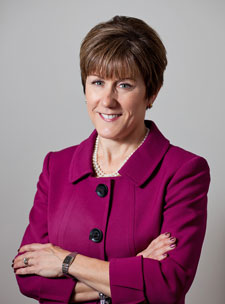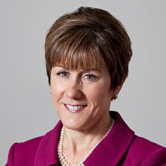 When reflecting on attempts at social change, sometimes it feels like I am watching a soap opera: I can tune out for years and then go back to it and not much has changed.
When reflecting on attempts at social change, sometimes it feels like I am watching a soap opera: I can tune out for years and then go back to it and not much has changed.
That is the feeling I get when listening to the pundits and policymakers regarding the tragedy and unrest that recently occurred in Baltimore and elsewhere.
We want better results for our children, families and communities, but we keep thinking we can get there simply by creating additional isolated programs and applying only technical fixes, such as police training and body cameras.
Until we face the fact that what we have are major adaptive challenges that require adaptive solutions — and if we continue to focus only on trying to change people one at a time and not change the context in which they live their daily lives — I fear my soap opera metaphor will continue unabated.
I have worked the majority of my career in the public sector striving to improve outcomes for children and families. Through these experiences, I have learned that if we truly want to achieve equity as a nation — defined simply as equal access and opportunity — we must stop thinking that halfhearted efforts to treat one another as we would want to be treated will work; it never has!
We must begin with genuine respect for one another and seeing each other as neighbors. Then we must put our actions and resources where our mouth is by pulling the four levers necessary for lasting systems and social change.
Until all four levers — policy, practice, regulatory and fiscal — are pulled, we will be having this same conversation 50 years from now. As a country, we can no longer afford to kick the can down the road; we can’t afford it financially and we can’t afford the tragic loss of human potential.
Why am I hopeful that this time is indeed different? Because a sleeping giant has been awakened. People across the country are waking up and participating in ways I have not seen for a very long time.
Even our youth are peacefully organizing and making their voices heard in incredible ways. Whether it was the quick reaction to Indiana’s “religious freedom” legislation, or watching with dismay the videos depicting police brutality and crimes, we are witnessing awareness by Americans that there is something deeply wrong in our society that we can no longer blame on others, ignore or just assume our elected leaders will take care of.
The answers we are seeking to many of these social ills, I believe, lie in the convergence of human capital development and equitable community/economic development, which must embrace authentic resident participation and voice.
We need to align our policies, daily practice, regulatory, and fiscal actions with current science and data that show that reducing toxic stressors will increase economic vitality through our greatest asset — our people.
This theory requires us to not only focus on the person, but the context in which they live their lives: affordable housing, jobs that pay a living wage, a quality public education system that extends from early childhood through post-secondary, access to affordable and nutritious food, access to quality health care, safe streets, parks and recreation, and a criminal justice system that is more preventive and rehabilitative.
We can’t just focus on one of these at a time. We must work on them concurrently, with the goal of not just having yet another promising initiative, but anchoring the changes we seek in the four levers.
Believe me, I have seen too many great attempts to reform the myriad of systems that impact people’s lives only to watch them fizzle out. The Sandtown-Winchester community in Baltimore is just one example. I am convinced it is because we keep trying to make programs and services within larger failed systems work — then we wonder why we aren’t seeing desired results.
What is an example of how we would pull all four levers? Let’s take the desired policy to have all children start school ready to learn. To experience true success with this goal, we would realize it is not enough to just focus on child care access and quality child care programs as we so often do today.
Rather, we would align the policies and practices of access to contraception to increase the number of planned births, quality prenatal care, safe and affordable housing, parent skill-building that is anchored in the science of child development and brain science beginning long before a child is born, quality child care, integrated health care and access to living wage employment.
We would make sure that this solid foundation is then backed up by a consistent regulatory environment that promotes it, rather than thwarts it, and we would pull the “holy grail” of the four levers when we align fiscal incentives and payments to only those policies, practices and regulations that support this foundation so that every child starts school ready to learn.
I now represent America’s private, nonprofit charitable human-serving sector through the Alliance for Strong Families and Communities. We have recently launched our signature work, the Commitments of High Impact Nonprofit Organizations. A few of those Commitments in the framework for impact are Advancing Equity, Engaging all Voices and Co-Creating with Community.
You see, our sector is far more than great providers of programs and services under contract with others. We are transformative agents of change governed by the community. We are leaders, community builders, innovators, great partners, smart advocates and magicians when it comes to creatively generating a broad array of resources in a community.
This is our moment to truly make a bold move toward bringing equity to all people in this country. It will take each of us doing our part.
It’s time to move from program thinking to social change thinking. But to experience true and lasting success, we must understand that all four levers required for systems change must be pulled.
Susan Dreyfus is the president and CEO of the Alliance for Strong Families and Communities, the nation’s largest network of human-serving organizations. Susan is the former secretary for the Washington State Department of Social and Health Services and Wisconsin’s first administrator of the Division of Children and Family Services. She is a member of Leadership 18, a coalition of CEOs from the largest and most respected nonprofit organizations in America, and a board member of the American Public Human Services Association, Generations United, National Human Services Assembly, and International Federation of Settlements and Neighborhood Centers. She was appointed to the 12-member National Commission to Eliminate Child Abuse and Neglect Fatalities in 2013.


























